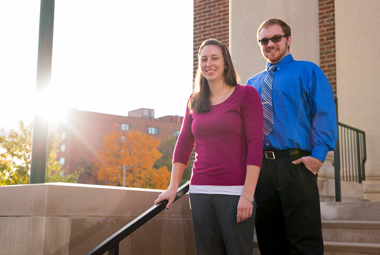Advancing in a Major Way
 |
|
Sophomore Keily Linger and senior Christopher Pounds, two of the first 100 CEHC majors, pose at the Downtown Campus, site of many CEHC classes in the program's second year of operation. (Photos by Carlo de Jesus) |
ALBANY, N.Y. (October 26, 2016) — The desire among young people to help their communities, state and nation be prepared for and protected from a growing number of natural and human-caused risks is heartening. That desire also may have been underestimated.
Testament to that is the explosive growth of the University’s College of Emergency Preparedness, Homeland Security and Cybersecurity (CEHC). The college opened in spring 2015 with a charge to build academic programs. Ahead of schedule, a minor was approved for fall 2015 with the hope of attracting 10-20 in the first year — a number that was expected to grow to about 100 minors in five years.
This fall, 2016, there are 320 minors.
No doubt, as the college launched the major this fall semester, expectations were a bit higher: a first-year total of 30 majors was anticipated, with that number growing to approximately 200 in five years.
This month, CEHC announced 122 student majors. Another 81 students have announced their intention to declare the major.
“We believe the rapid growth in majors is due to the convergence of three factors,” said David Rousseau, interim CEHC dean and associate professor in the Department of Political Science. “First, the topics addressed by the college, from terrorism and immigration to cybersecurity to severe weather, are some of the most pressing issues facing the world today.
“Second, the interdisciplinary nature of the our college allows us to offer a broad range of interesting courses such as human trafficking, disaster psychology, public health preparedness, and leadership and ethics. Finally, the new major’s focus on applied learning through internships, capstones, research and training appeals to student who want to engage in real-world issues during the course of their college careers.”
Notably, many of the new majors came to UAlbany specifically because of the creation of CEHC, and now are particularly excited by the major — either taken alone or as part of a double major with programs such as Digital Forensics, Public Administration and Criminal Justice.
"Making the decision to double major in homeland security and criminal justice has been the best academic decision I could have made,” said sophomore Justin Leathers. “All the career updates and connections I have made so far are just simply unmatched. I’d recommend this major/minor for any student who is dedicated to establishing his or her own future, years before everyone else would ever have expected them to."
"I am very grateful that the University established the College and had it ready to take off this year,” said Devyn Fernandez, a sophomore transfer from HVCC with an associate’s degree in criminal justice who wants to work in federal law enforcement. Just since the start of the semester, he said his commitment to working in national security has deepened. "The hands-on training experiences that we are given have had a great impact on my desire to help keep our citizens safe. I look forward to the next few years," he said.
Senior Christopher Pounds came to UAlbany as a pre-med student in 2008, but left because he realized he preferred emergency medical service and management, and had an affinity for field work. “I always had an urge to return and finish my educational career as a Great Dane. So when Gov. Cuomo announced the new college, I knew I had return to UAlbany and graduate with the major. I am so excited to be completing that goal this spring, and moving on in my career in emergency preparedness and management.”
Keily Linger wanted to attend a college that would prepare her for a career in homeland security. She declared the minor a year ago in tandem with a major in Public Policy, and is now majoring in both. “This will help me immensely in the career I hope to make for myself in a field related to emergency disaster response and management or homeland security,” she said. “I believe I will have a different set of skills from many other people applying.”
Linger, a sophomore, said the design of the UAlbany major provides additional benefits. “Most programs in this area are either specifically about intelligence, management, response or cybersecurity,” she said. “This program allows you to gain insight into each one, which is invaluable because the three are so closely related that it is important to have at least the bare bones of each.”
She also praised the new student clubs, including the Cyber Defense Organization, the UAlbany Alliance for Security and Preparedness and the International Association of Emergency Managers, that closely relate to the major and provide additional preparation.
CEHC is moving ahead with faculty recruitment and hiring to accommodate its increasing student numbers. There are currently four tenure-track faculty, with three more to be added in fall 2017, with a reachable goal of at least 15 faculty by 2020.
![]() For more news, subscribe to UAlbany's RSS headline feeds
For more news, subscribe to UAlbany's RSS headline feeds
A comprehensive public research university, the University at Albany-SUNY offers more than 120 undergraduate majors and minors and 125 master's, doctoral and graduate certificate programs. UAlbany is a leader among all New York State colleges and universities in such diverse fields as atmospheric and environmental sciences, business, education, public health,health sciences, criminal justice, emergency preparedness, engineering and applied sciences, informatics, public administration, social welfare and sociology, taught by an extensive roster of faculty experts. It also offers expanded academic and research opportunities for students through an affiliation with Albany Law School. With a curriculum enhanced by 600 study-abroad opportunities, UAlbany launches great careers.


